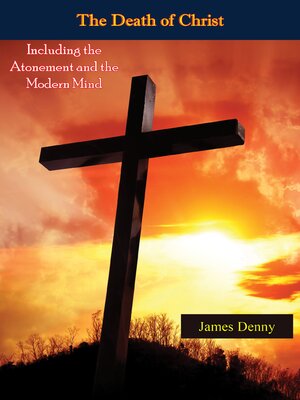
Sign up to save your library
With an OverDrive account, you can save your favorite libraries for at-a-glance information about availability. Find out more about OverDrive accounts.
Find this title in Libby, the library reading app by OverDrive.



Search for a digital library with this title
Title found at these libraries:
| Library Name | Distance |
|---|---|
| Loading... |
The Death of Christ, Including the Atonement and the Modern Mind by James Denny is a profound theological examination of the significance of Christ's death and its enduring relevance in contemporary thought. Originally published in the early 20th century, Denny's work addresses the doctrine of atonement, aiming to reconcile traditional Christian beliefs with the challenges posed by modern philosophical and cultural perspectives. Denny explores the centrality of Christ's sacrificial death in Christian theology, emphasizing the importance of understanding the atonement not merely as an abstract doctrine but as the foundation of faith and salvation. He provides a careful analysis of biblical passages, highlighting the meaning of Christ's suffering and the profound love of God demonstrated through the cross. With clarity and precision, Denny defends the atonement against modern objections, arguing that it remains indispensable to the Christian message. Throughout the book, Denny engages with the intellectual currents of his time, including rationalism, moral philosophy, and liberal theology, addressing the tension between traditional interpretations and contemporary sensibilities. He insists that any effort to reinterpret Christianity without the cross diminishes the transformative power of the Gospel. For Denny, the death of Christ is not merely symbolic but a concrete act of divine love that offers redemption and reconciliation for all humanity. The Death of Christ continues to resonate with readers and theologians for its thoughtful engagement with the atonement in light of modern concerns. It challenges believers to appreciate the depth of God's grace and invites them to embrace the cross as the heart of Christian faith. For those interested in theology, the nature of redemption, and the interaction between faith and modern thought, Denny's work remains a compelling and essential read.







